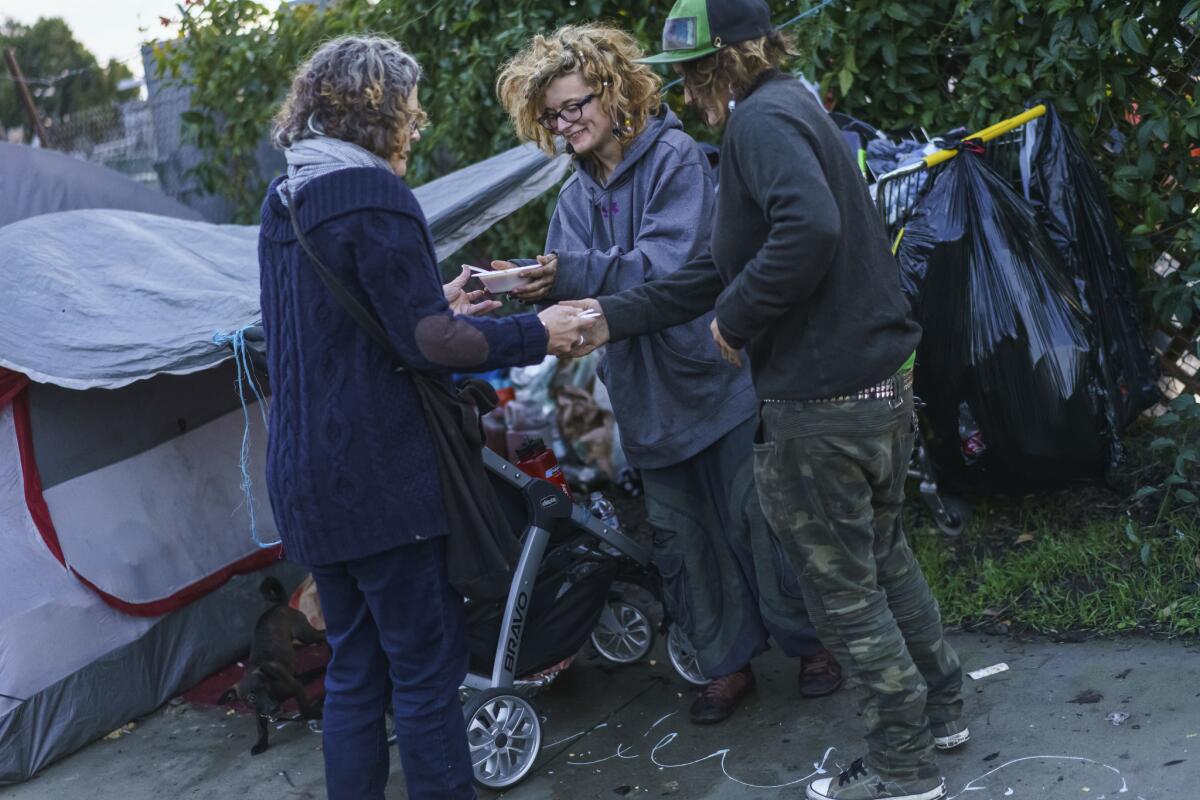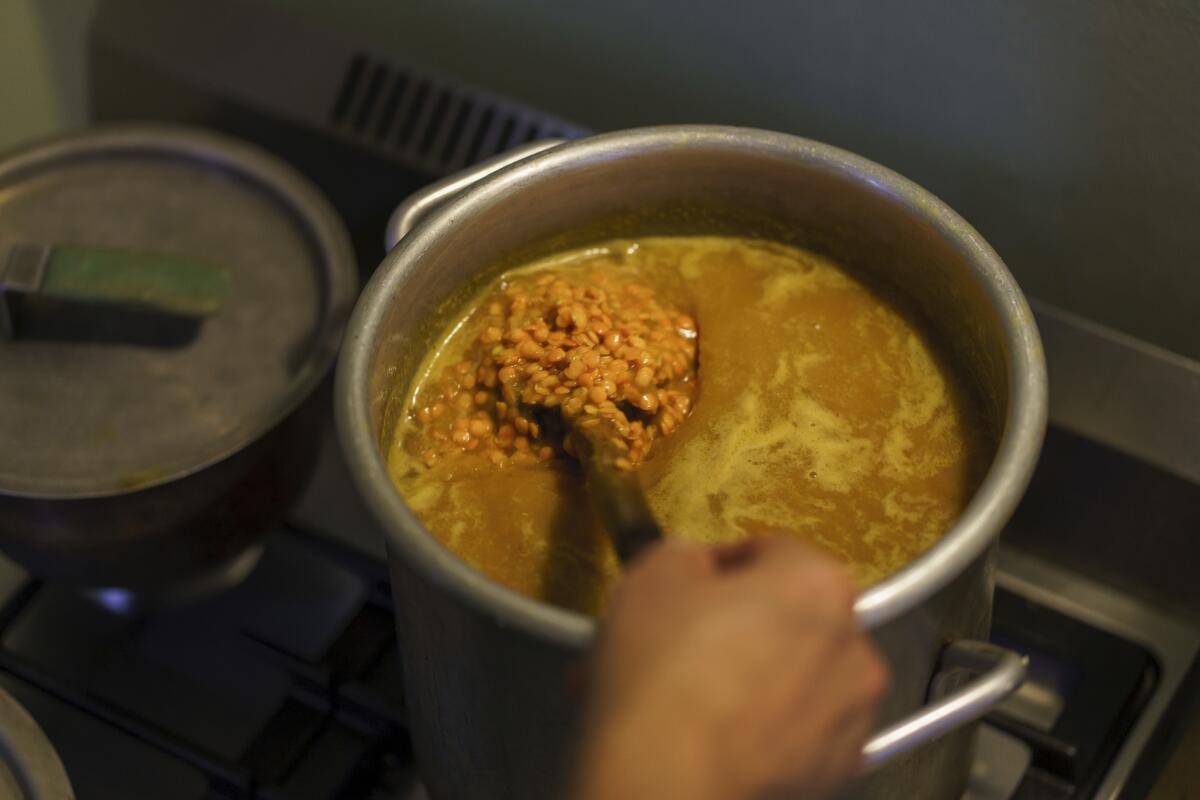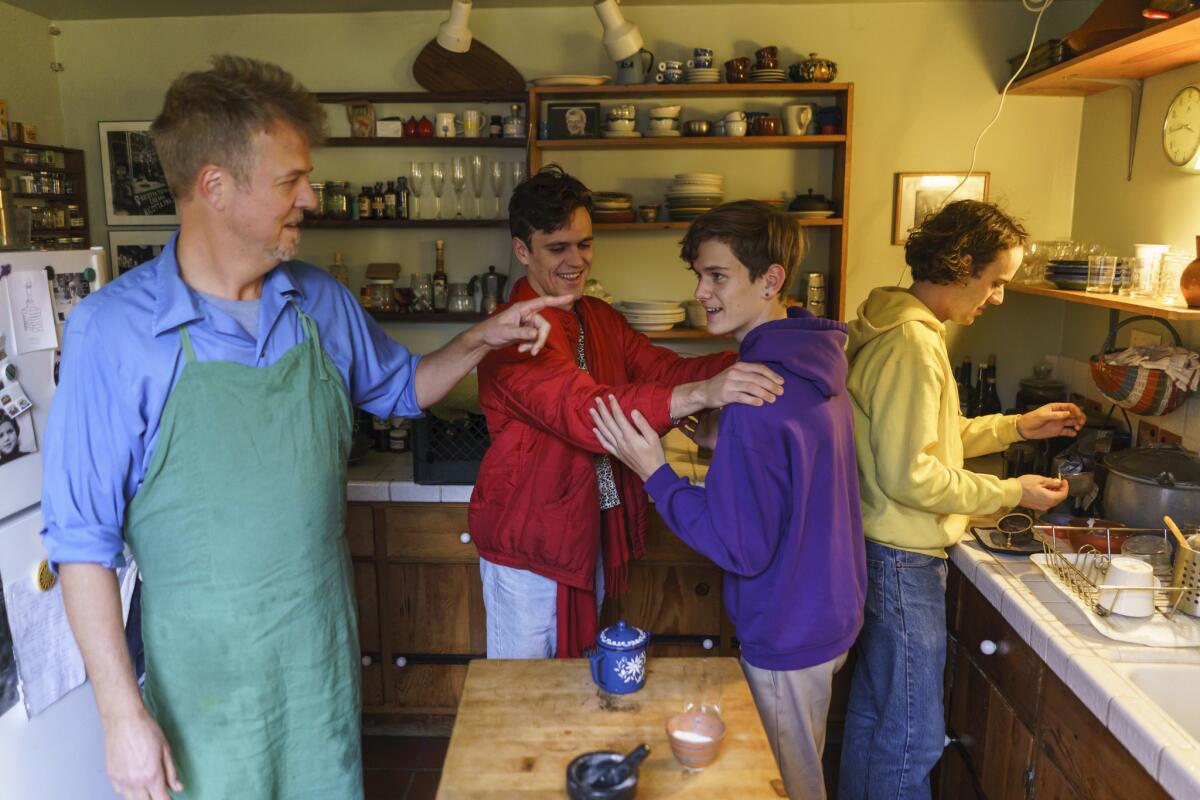From fine dining to the streets: A Berkeley chef feeds the homeless

- Share via
The hatchback hugs the verge of frontage highway farthest from the rush of cars. Lanes of rush-hour traffic surge on the interstate, a blur of black shapes and headlights in the dark. Cal Peternell parks his car in the service lane along the highway, near an embankment where tents huddle close amid a litter of tarps and shopping carts and random objects that are hard to make sense of in the reflected light of cars speeding by.
Peternell’s wife, Kathleen Henderson, has been riding in back, next to a milk crate buckled in like a baby’s car seat. The crate holds a two-gallon aluminum pot; a couple of large black binder clips keep the lid secure. She jumps out of the car and, over the din of traffic, yells at the tents: “We got hot soup! Anybody want soup in there?” A woman’s voice sounds a faint yes.
Peternell sinks a ladle into marigold-yellow dal and comes up with a serving he tips into a flimsy paper bowl, inserts a plastic spoon, and hands it to Henderson, who walks it to the tent. “It’s like Indian split pea,” she explains to the woman, who’s thin and pale and in her mid-30s, wearing a beanie pulled down over her ears and a big fleece jacket. Gingerly spooning hot soup into her mouth, she says it tastes good. “Babe,” she yells at the tent, “you want soup?” But whoever’s inside doesn’t.

We’re a little more than two miles from Chez Panisse, the eminent Berkeley restaurant where Peternell spent more than two decades in the kitchen. Today, Peternell’s life is marked by car runs with hot dal to feed some of Berkeley’s homeless, a woke food podcast called “Cooking by Ear,” plans to cook for journalists at a new co-working space in Oakland and culinary lessons for inmates at San Quentin.
Peternell and Henderson recently moved to southwest Berkeley, but they used to live more centrally, close to Berkeley High and the downtown BART station, where some of the city’s more than 1,000 homeless residents (about 1% of Berkeley’s population, according to the mayor’s office) squat in parks or on the sidewalk.
“So many people on the street,” Peternell says. “I would do what I think a lot of people do, which is to kind of try to ignore them.” But avoiding eye contact or, at best, forking over a dollar or two, made him feel guilty.
“It’s just so awful,” he said. “I’m sure we all have these feelings, like these people are somehow our neighbors, and if your neighbor needed help you’d give it to them. So why are we not really helping them?”
At the end of 2016, when Peternell stepped away from his job as chef, he joined the ranks of elite alumni of cooks who’ve sought meaning after Chez Panisse. Workers past and current are part of a community so rarefied they’re known informally within the circle as the Chez family, or sometimes, perhaps pretentiously, as famille Panisse. But even as Peternell has worked to define himself as an activist, he’s launched a career as an author of cookbooks that reflect the Alice Waters brand: pristine produce and meats, cooked in ways that accept Provence and Italy as essential parts of Northern California’s food geography. It’s the dilemma for members of famille Panisse who no longer work at the restaurant and wish to break free: How to define themselves apart from Chez Panisse, even as they get press and book deals in part from the connection.
“Cooking by Ear” premiered last year. Peternell usually shows up in a guest’s kitchen and guides them through making something. “I think everyone has a gateway dish,” Peternell says as the tagline to each episode. “And we’re on a quest to find yours.” The first season had a roster of guests impressive for its diversity: actress Frances McDormand, queer Native American poet Tommy Pico and New Orleans bounce artist Big Freedia, among others. Season 2 is slated to be kick off in March with Bob the Drag Queen.
Peternell started handing out soup about the time the podcast launched. Since then he’s worked with Consider the Homeless!, a nonprofit led by housing activist Barbara Brust. Two days a week, Brust’s organization picks up soup cooked by a loose network of volunteers and serves it to people living on Berkeley’s streets, but Peternell and Henderson still do their own drops too, like tonight’s.
“It does feel good to put a bowl of soup in someone’s hand,” he says, “but I also feel like, I’m really into cooking. I should just go with my strength.”
And in a way, Peternell’s dal, cooked in his Berkeley kitchen just before he strapped it into the Passat, is his own gateway dish: his soup of moving on, while toting with him the things he loved about Chez Panisse.
“I kind of settled on dal because I love dal,” Peternell says. “I don’t know, it just seems so essential and nourishing, and you get lots of flavor because you put lots of spices in.” And dal is definitely not part of the Waters brand. Cooking on your own terms, outside the circumscriptions of Chez Panisse, is something cooks wrestle with when they leave.

“You use something a little different, you use a few too many herbs: You cross the line,” says Russell Moore, another 20-year Panisse veteran, who recently closed his restaurant Camino in Oakland. Much like Peternell (with whom he cooked for many years), he found that breaking out while you’re still working at the restaurant is difficult, if not impossible.
Chez Panisse, Moore says, is a place with strict rules. “Cal and I know those rules really well,” Moore says. A dish could never contain cilantro, for example, since it would clash with Waters’ well-established flavor scheme. “You would never mix mint and oregano,” Moore says, since that would take a dish in a Spanish direction and into Waters’ forbidden zone. But how to make sense of the world so close to the restaurant’s front door?
“I don’t think I’m the first chef who gets to a place where they’re ready for some other thing in their life,” Peternell says. “Chez Panisse is Alice’s place, as it should be, and she’s brilliant, and she’s done all the wonderful things for the food community, and the state of food in America. But it’s like Nancy Pelosi,” he says. “Aren’t there young people coming behind?”
One of those coming behind is Tu David Phu, a first-generation Vietnamese American chef from Oakland, one of the San Francisco Chronicle’s Rising Star Chefs for 2017. It was Phu who introduced Peternell to the inmate mentorship program at San Quentin. “There’s this saying in hip-hop,” Phu says: “‘Real recognizes real.’ Cal is super-real and I recognize that.”
Part of what changed for Peternell was a feeling that he couldn’t look at the world beyond the kitchen as a separate place. “I think we’ve all been somewhat radicalized by the horrifying government we have in place, and just feeling a need to represent something other than what the guy in the White House represents.”

Since leaving the restaurant, Peternell has done a lot of reading. He’s had conversations about gender and racial politics with his two adult sons, both in their 20s. He cites his awareness of race in America and understanding his own particular privilege.
He seems like a man simultaneously atoning and trying to find his voice, his purpose as a chef. “At the end of the day it’s not even about trying to be the best chef,” says Phu, who’s become a kind of mentor in social justice to the older chef. “With the economic state that we’re in, to me that’s what it boils down to. As chefs we have these skills. It’s on us to do whatever … we can to dig us out of this hole.”
After leaving the frontage road, Peternell and Henderson look for homeless camps on 4th Street, just south of a cluster of retail that includes an Apple store, a Warby Parker and a new Amazon 4-Star emporium. They find two large tents pieced together from tarps and an old store awning, pushed up against a fence that fronts the stainless-steel tanks of a sake brewery. Two young guys in raised hoodies and heavy jackets emerge to take Peternell’s dal. “Hey, Dan,” one of them yells at the other tent. “There’s soup.”
After a couple of minutes Dan comes out, middle-aged and with bare feet, grinning. He asks for two bowls.
More to Read
Eat your way across L.A.
Get our weekly Tasting Notes newsletter for reviews, news and more.
You may occasionally receive promotional content from the Los Angeles Times.










